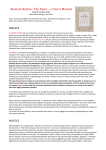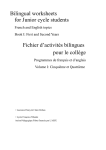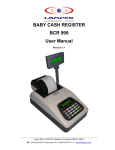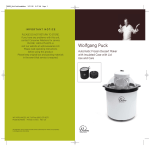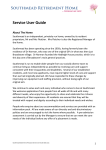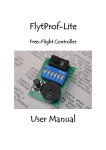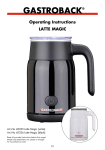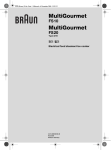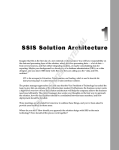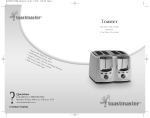Download Service User GUIDE - Aspreys Nursing Home
Transcript
Service User GUIDE Service User Guide. Amended 20 April 2009. Printed 08/12/2009 1 COMPLAINTS PROCEDURE. You have the right to make a complaint about anything with which you are unhappy or displeased. It is our aim to make your stay at Aspreys as comfortable as possible, so please do not feel that you should not air your feelings as we would like to know if we are not achieving that aim. Listed below are different ways of making a complaint. 1 Mention your complaint verbally to any member of staff or management. 2 Put your complaint in writing to Matron or the Lead Nurse. This may be posted to the address of the Home, or just handed in to the office in a sealed envelope. 3 Put your complaint in writing to Mr R T Morris who is the Managing Director of the company that owns Aspreys. This may be posted to the address of the Home, or just handed in to the office in a sealed envelope. Each of the above options will normally be dealt with within the Home in complete privacy. We have laid down procedures for dealing with complaints which should ensure that a swift and satisfactory outcome is achieved. We endeavour to ensure that any complaint is satisfactorily addressed within a period of 28 days. 4 If you have made a complaint and you do not feel that it has been dealt with properly, or you are not satisfied with the outcome, you should then contact your Social Worker, Care Manager or Doctor. 5 At any time, you also have the right to make a complaint to the relevant governing body, which is; Care Quality Commission Telephone: 03000 616161 Email: [email protected] CQC National Correspondence PO Box 1258 Newcastle upon Tyne NE99 5AU Naturally, we hope that you will not need to use any of these options, but should they be necessary, we will to the best of our endeavour, ensure that your complaint is resolved to your satisfaction. In any case you will be kept informed about the progress that is being made, or action that is being taken in connection with your complaint. Service User Guide. Amended 20 April 2009. Printed 08/12/2009 2 Welcome to Aspreys PHILOSOPHY OF CARE Our Philosophy of Care at Aspreys aims to provide a caring and homely atmosphere which respects the individuality, dignity, independence and right to privacy of each resident. Our Philosophy is based upon our establishment of positive relationships with the residents, their families and the staff. We aim to create a non-institutional regime that enables residents to lead a fulfilled life and to achieve the highest potential that their condition permits physically, socially, emotionally and spiritually. Summary of Purpose of the Home: Aspreys is owned by Friendly Care Homes Limited. Aspreys enables older people to continue living as independently as possible by receiving care and support consistent with their incapacities and disabilities. We continue to value each and every individual, who comes to live at Aspreys. We welcome applications from people from all walks of life and with many different needs, who enjoy the opportunity to share and celebrate the richness and diversity of their experiences. All residents are assured that they will be treated with respect and dignity according to their individual needs and wishes. People who enquire about our accommodation and services can be provided with an information pack. We have diversity and anti-discriminatory policies and people are encouraged to visit the Home before continuing with their application. They may then apply directly for a place at Aspreys. All applications, (though not always in emergencies), follow an assessment of need made by the Manager, and sometimes in conjunction with the family, doctor and district nurse, and, where applicable, the local authority social services. This may include an assessment of their financial circumstances, which will determine any funding to which they may be entitled as a contribution towards the costs of their accommodation and care. Each application is given careful consideration by the Home’s management and, depending on vacancies, a decision to offer a place or not, is made as soon as possible. Where there is no current vacancy, applicants can be placed on a waiting list. Service User Guide. Amended 20 April 2009. Printed 08/12/2009 3 Number of Places and for Whom: Aspreys is a Registered Care Home, and aims to provide a high standard of accommodation and care in 30 rooms. 28 of the rooms are generally for single occupancy, with up to 3 being large enough to accommodate married couples or partners, who wish to live together by choice. All accommodation complies with the National Minimum Standards that came into force from 1 April 2002. Anyone over the age of 65 years, including married couples or partners, who because of physical incapacities require help with daily living, is entitled to apply for a place at Aspreys. Most of our residents are in their 80’s and 90’s. As Torquay is a multi-cultural town, with several established ethnic communities, we operate a diversity policy in respect of residents and staff, and are committed to ensuring that no one is excluded on the grounds of their ethnicity, religion or culture. We therefore discuss with each applicant, how their individual and cultural needs can be met. Qualifications of Registered Provider, Manager and Staff: In addition to a Registered Manager, 8 registered nurses, Fifteen care assistants (fulltime/part-time), two cooks, two domestic staff, one activity co-ordinator, and a maintenance person. There is always one registered nurse and other care staff available throughout the night, and a senior staff member is always on call. All ancillary staff receive training in the Home’s philosophy and values. The Home is fully committed to staff learning and development. The Manager’s post is vacant at the time of printing. Other care staff are either have or are working towards their NVQ’s. Description of Accommodation, Support, Facilities and Specialist Services: The individual resident’s Agreed Plan of Care provides the basis on which Aspreys care service is delivered. Each person’s plan includes a description of their preferred daily routine, their likes and dislikes in relation to food and any specific dietary requirements and similar matters. It includes their preferences in respect of how they like to be addressed and what dignity, respect and privacy means to them in terms of daily behaviour and actions. We find that it is particularly important to find this out in relation to any intimate personal care that staff are expected to carry out. The care plan also contains a risk assessment and any risk management plan needed. It includes details of health care needs, medication, details of GP and any community nursing or other therapeutic services provided or that the resident commissions for her or himself. Each resident is allocated a member of the care staff to act as a Key Worker. Key Workers will be responsible for monitoring, reviewing and co-ordinating the service plans for their residents. Their will duties include preparing residents, and gathering information, for their reviews, which are held at least six monthly and more often if needed. Service User Guide. Amended 20 April 2009. Printed 08/12/2009 4 Key workers undergo regular supervision by their team leader, a Qualified Nurse and/or the Manager, who share responsibilities for chairing reviews and for communicating with outside professionals, who may also be involved with particular residents. The daily care programme is organised as a response to residents’ individual and combined needs. All mealtimes are flexible, and residents can request meals in their own rooms or in the dining room. We have 2 lounges that provide for the differing social interaction requirements of each person. This provides choice and reflects residents’ preferences where they are able to express them. User Surveys and Views of the Home: We are committed to maintaining and improving the quality of our service. An important part of our approach to quality assurance is to obtain the views of all our stakeholders, particularly those of residents, relatives and their representatives. We do this by our regular reviews with individual residents and, on more general matters, through separate meetings with residents and relatives. We invite comments and feedback from all patients, relatives and visitors using a specific form tailored to the group. We also carry out a detailed annual survey. All responses are considered and action taken where appropriate. Key Contract Terms – Admission, Occupancy, Termination of Contract: When people move in they have one month built into their occupancy agreement to decide whether “this is the place for them”. This first month then provides an opportunity for staff to get to know the individual resident and their family, and to identify their wants and preferred ways of living, e.g. the time they like to get up in the morning and to go to bed at night. During this period the person’s care and support requirements are also assessed and discussed, and developed into an agreed plan. This will include discussion and assessment of any risks to which the resident or staff may be exposed as a result of making their own choices and decisions. It also includes discussion, with the agreement of the resident, with any relatives or representatives who may be involved about the person’s care needs and plans. The aim is to achieve a plan of care with which everyone involved is happy. Fees Charged, What they Cover, Cost of Extra: Fees are payable Calendar Monthly in advance by Bank Standing Order. Some or all of these fees may be met by the local authority/health service, in which case their payment terms apply. Fees are reviewed annually in April and October, or if a change in needs makes it necessary. Fees include all care and accommodation costs, food and drink, heating and lighting, any in-house laundry and any other services our staff provide. Service users are expected to pay for personal items such as newspapers, tapes, books, magazines and for other services provided at Aspreys such as hairdressing, chiropody, accompanied visits to appointments, travel costs and some outings. Residents are free to make their own arrangements for buying in such services. Service User Guide. Amended 20 April 2009. Printed 08/12/2009 5 STATEMENT OF FACILITIES • 27 single rooms (many with en-suites) • Up to 3 double rooms (all en suite) • Five bathrooms (3 with wc’s) • 6 separate WCs • 2 Large TV lounges (ground floor) • Dining room (Lower Ground floor) • Fully fitted kitchen • Laundry • Nurses Station and Admin office • Courtyard garden • Car parking • Courtesy Car • Hairdressing Salon Service User Guide. Amended 20 April 2009. Printed 08/12/2009 6 MANGEMENT / STAFF STRUCTURE Friendly Care Homes Ltd Tim Morris Our Manager’s post is currently vacant Registered Nurses. Cook Timea Vadaszova Nicola Taylor, Karen Ball, Rebecca Felloni, Rufina Edoc, Josefina Duping, Irene Premo, Clare Smith. Head of Care Gill Plaistow Senior Care Assistant: Helena Haskins Care Assistants Francis Cotton, Claire Miller, Julie Horne, Joan Adamson, Mary Little, Shirley Acosta, Sarah Crook, Naomi Williams, Maria Halshaw. Derek Duping Domestics/Laundry Assistants: Amanda Heal Joan Adamson Maintenance Vic Lee Because of occasional staff changes, you should be aware that the above is intended merely as a guide. Service User Guide. Amended 20 April 2009. Printed 08/12/2009 7 STAFFING We are aware that the Home’s staff will always play a very important role in residents’ welfare. To maximise this contribution, we will do the following: 1. Employ staff in sufficient numbers and with the relevant mix of skills to meet residents’ needs. 2. Observe recruitment policies and practices that both respect equal opportunities and protect residents’ safety and welfare. 3. Offer our staff training that is relevant to their induction, foundation experience and further development by way of NVQ training. Several staff have already achieved NVQ qualifications. The number of staff varies as the staff rota can be covered by a mix of full and part time staff. SERVICE CATEGORY Care home with nursing (N) Service user’s categories Sex Physical disability over 65 years of age (PD(E)) Old Age, not falling within any other category (OP) 33 both 10 both Two Lower Ground Floor rooms not available to those requiring Nursing Maximum Number Registered Service User Guide. Amended 20 April 2009. Printed 08/12/2009 33 8 Aspreys Nursing home SCALE OF FEES for new or reviewed residents as from April 1st 2009 Our fees are calculated according to Client needs and the Room occupied. Currently our fees range from £ 310 - £ 600 per week inclusive of any Free Nursing Care payment award. For Private Clients • Fees are payable one month in advance by way of bank standing order. • Fees are calculated on a calendar monthly basis. • We normally review our fee structure in the April of each year, however, there may be occasions when we have to increase our fees at other times due to, say, unbudgeted staff wage increases or imposed Government related or supplier costs. For Funded Clients • Fees are paid by the Local Authority or Social Services, and all arrangements for our fees are made with them. If you are unaware of our fees for your care, and you would like to know, please ask for details. Service User Guide. Amended 20 April 2009. Printed 08/12/2009 9 Friendly Care Homes Limited 1 Kents Road, Wellswood, Torquay TQ1 2NL 01803 201500 RESIDENTS CONTRACT TERMS AND CONDITIONS OF RESIDENCE AT ASPREYS The Staff and Management are proud of the outstanding reputation earned by Aspreys, which has operated as a Nursing Home for many years. For the protection of the rights of both the Residents and Aspreys, it is necessary to operate under agreed Terms and Conditions. These are as follows: 1. INTRODUCTION. Aspreys is pleased to welcome Residents on the following terms and conditions which shall be accepted by them or their representative by signing the requisite form. 2. TRIAL PERIOD. The Resident will initially be accommodated on a trial basis of at least four weeks. If at any time prior to the trial period expiring, the Resident or the Aspreys Management decide that permanent residence would not be suitable for whatever reason, residence will terminate on notice in writing to the other party. The Resident will then vacate the home at a time to be agreed. Fees will be payable under the usual arrangements, as specified in clause 5 below, from the commencement of the trial period. Any refund due on early termination will be forwarded as soon as possible after the Resident’s departure. 3. RESERVATIONS AND DEPOSITS. A vacancy can be held for a prospective Resident but a non-refundable charge will be made (usually 100% of the room fee) to be paid in advance. This fee is negotiable under special circumstances. 4. CARE. Fees will cover the provision of: • Furnished accommodation. • Light and heat. • Meals and beverages. • Normal washing and ironing of machine washable clothing. • Linen. • Assistance with personal needs. Please note: in the case of illness clause 5.B may apply. Any other personal items or services will need to be paid for by the Resident or their relatives. 5. FEES. A. Fees are payable by Banker’s Standing Order calendar monthly in advance. B. Review of fees: 28 days prior notice of any fee review will be given in writing to the Resident and/or the family or representative. Aspreys reserves the right to: a) Change the fees if the resident changes their room to one of a different category. b) Change the fees if running costs justify it. c) Charge a supplementary fee for additional costs if the Resident’s health condition requires staff to work overtime to attend to the special needs of the Resident. C. Notice: 28 days notice is required to cancel the agreement for whatever reason. However in the event of the death of the Resident fees are payable up to one week after or until the room is cleared whichever is the later. D. Absence Fees: Residents who are in hospital or on holiday or absent for any other reason will be charged the normal fees. Fees remain payable while any possessions are left in the home. 6. BENEFITS. Aspreys will advise and assist Residents in making applications for benefits and/or allowances if required. Service User Guide. Amended 20 April 2009. Printed 08/12/2009 11 7. PERSONAL POSSESSIONS, VALUABLES AND PERSONAL EXPENSES. Furniture: Residents are welcome to have some of their own furniture where practical and after prior arrangement with and at the discretion of Aspreys. If the furniture is defective or constitutes a danger, the Resident may be requested to have it removed. When the Resident leaves the home, all furniture and personal effects must be removed within a reasonable period of time. A room is considered occupied and full fees will be charged until all furniture and personal possessions are removed from the home. Insurance of possessions: Residents/Relatives are requested to arrange their own Insurance cover if they think fit. Aspreys will not accept the responsibility for effects lost, stolen, damaged, destroyed or mislaid. Laundry facilities: All laundering is carried out on the premises. Residents’ clothing should therefore be labelled with sewn-on name-tapes or room number clearly marked on labels and be suitable for washing and drying. Whilst every care is taken to look after personal laundry, it will be machine washed and dried. As a result, Aspreys cannot be held responsible for accidental damage or loss. Nor does Aspreys accept responsibility for clothes that should be hand-washed, dry cleaned or that are unlabelled. Personal Expenses: Residents shall from their own resources finance medical requisites (other than medication by prescription). Escorted visits to hospital and other appointments (Hourly rate and mileage allowance chargeable), etc, hairdressing, chiropody, newspapers, clothing and other items of a luxury or personal nature that are required. 8. MOVING ROOMS. Every effort will be made to ensure every Resident enjoys an uninterrupted tenure within the room of their choice. Occasionally, however, it may be necessary to relocate a Resident into another room. This should only occur : - If repairs or redecoration to the room are required If there are changes in personal circumstances For reasons of health and safety 9. USE OF FACILITIES. All facilities of Aspreys including bathrooms, lounges and communal areas inside and outside within the home’s boundaries, are available for unrestricted use by all Residents. It may become necessary, however, to restrict activity or access for reasons of safety. Service User Guide. Amended 20 April 2009. Printed 08/12/2009 12 10. VISITING. Visitors are welcome at any time although it is suggested that meal times be avoided. When a Resident is to be taken for an outing, Aspreys requests that prior notice be given. This ensures: - The Resident can be ready for the outing Any medications required during the absence can be prepared Meal times can be re-arranged where necessary Aspreys knows where the Resident is 11. MEDICINES. It is in the interest of the Resident’s well-being, that on arrival, all drugs in their possession are shown to a senior member of staff. Where necessary, Aspreys may request that these be handed over for safe-keeping and administration. In the interest of the Resident’s safety, Aspreys reserves the right to supervise the use and consumption of all drugs and medication. 12. SMOKING AND FIRE REGULATIONS. Aspreys is a ‘No Smoking’ area. We are unable to accept Clients that may wish to smoke on our premises or in the grounds. 13. ALCOHOL. Alcoholic beverages are permitted. 14. PERMANENCE. Every endeavour is made to keep residents in the home even if ill, provided the Doctor is satisfied the home can give the care required. The Management undertake to enlist the support of the appropriate services and authorities as necessary to enable the Resident to remain in the home in the event of illness, should the Resident so wish. However, Management reserves the right to ask the resident to leave if the home is unable to give the special care required. Aspreys Management also reserves the right to ask any Resident who may cause disharmony or persist in practices which endanger the safety of the other Residents to leave the home. 15. GUARANTEE/RESPONSIBILITY FOR CHARGE. The Resident and/or the relative and/or the responsible representative who sign the agreement assume personal joint and several responsibility and liability to pay all fees, charges, extras etc. as may be claimed in terms of this agreement. Management may at its sole discretion recover all or any part of the sums owing in terms of this agreement from any or all parties. If the Resident’s affairs are to be managed by the Court of Protection, his/her representative undertakes to accept responsibility for any debts accruing to Aspreys before and whilst the Resident’s affairs are being processed by the court. Service User Guide. Amended 20 April 2009. Printed 08/12/2009 13 16. NOTICE. If the Resident is found to be in need of intensive care or other specialist attention in excess of that provided at Aspreys, then on the appropriate advice, this agreement may be terminated without penalty. This would allow the Resident to be relocated into a suitable home or hospital. In compliance with the law, Aspreys reserves the right to require the Resident to vacate the home if, in theirs or a qualified medical practitioner’ opinion, the Resident becomes unsuitable for continued accommodation on the grounds of ill-health. In the event of illness, the Resident will be cared for at Aspreys. If, however, a doctor decides that further care is required in excess of that available at Aspreys, alternative arrangements may have to be made. Under such circumstances, 28 days notice from the Resident or their representatives, is required in writing to Aspreys. Alternatively, an equivalent period’s fees in lieu of notice can be paid. Aspreys reserves the right to give the Resident or their representative 28 days notice in writing to terminate this agreement and to require the Resident to leave the home: - if the Resident becomes unwilling or unable to continue in residence or should the Resident persist in unsociable behaviour to the discomfort of other Residents If the Resident fails to pay the fees or any other sum owing to Aspreys, the Resident may upon notice in writing, be required to vacate the home unless the correct payment is made within seven days. Thereafter, if payment or any part thereof remains owing, the Resident shall be requested to vacate the home without further notice. 17. GRATUITIES, GIFTS AND SHOPPING. Gratuities must not be given to individual members of staff. However, donations towards a staff welfare fund may be made via Aspreys. Members of staff are not allowed to accept gifts from Residents or their representatives without the prior written consent of Aspreys. Residents may ask Aspreys for any purchases to be made on their behalf. 18. LEGAL AND OTHER ADVICE AND CORRESPONDENCE. Aspreys advises that those Residents who are unable or who prefer not to control their own financial affairs, should arrange for their solicitor, bank manager, accountant or next of kin to control them on their behalf. Aspreys has no responsibility for, or interest in, or claim on a Resident’s financial resources or estate. Aspreys will not willingly deal with Resident’s pension books and may require a relative or representative to deal with them. Any notices or correspondence relating to this agreement will be delivered to the resident at Aspreys, or to the representative at their home, unless otherwise instructed. Service User Guide. Amended 20 April 2009. Printed 08/12/2009 14 This Agreement is made between Friendly Care Homes Limited, and …………………………………………………...………………. (The Resident). relating to the acceptance by the Resident of accommodation and care at Aspreys, whose address is 1 Kents Road, Torquay, TQ1 2NL 1. Aspreys agrees to allocate and the Resident accepts the use of Room No…...... 2. The current assessed level of care required is Nursing Low / Medium / High Dependency. The weekly fee is £ …..... Payment is required by standing order in advance as set out in 5(A) which calculates to £ ..……… per Calendar Month. 3. The Health and Social Care Act 2001 provides for funding of a Registered Nurses assessed input to Nursing Care. The parties hereby agree that the Resident shall continue to pay Aspreys the full costs including the costs of nursing the Resident as set out above, and a refund will be made to the Resident of any payment received from any external agency whether it be the National Health Service, a Primary Care Trust or any other source of payment or part payment of the costs of nursing the Resident within one month of receipt of the same by Aspreys. 4. The Resident accepts all the terms and conditions as printed in this Agreement. Signed ………………………………………..Manager. On behalf of Aspreys Dated ……………………………………….. Signed ………………………………………..Resident / Representative / Person with Power of Attorney Dated ………………………………………… Service User Guide. Amended 20 April 2009. Printed 08/12/2009 15 This Agreement is made between Friendly Care Homes Limited and ……………………………………………………….. ( The Resident ). relating to the acceptance by the Resident of accommodation and care at Aspreys, whose address is 1 Kents Road, Torquay, TQ1 2NL 1. Aspreys agrees to allocate and the Resident accepts the use of Room No……. 2. The current assessed level of care required is Nursing Low / Medium / High Dependency. The weekly fee is £..……..…The gross payment shall be payable by Social Services under Agreement No…………………………… 3. The Health and Social Care Act 2001 provides for funding of a Registered Nurses assessed input to Nursing Care. Any payments received in this respect form part of the weekly fee required for the same. 4. The Resident accepts all the terms and conditions as printed in this Agreement. Signed ………………………………… Manager on behalf of Aspreys Dated …………………………………. Signed ………………………………… Resident/Representative/Person with Power of Attorney Dated …………………………………… Service User Guide. Amended 20 April 2009. Printed 08/12/2009 16 ACTIVITIES Aspreys believes that activities can form an extremely important part of life in our Care Home. In addition to in-house stimulation from the Carers, we have a varied selection of visiting entertainers and professional people, all able to provide stimulation and/or exercise for those that wish to participate. These services are usually provided by; Antics Activities Brixham Activities Particularly popular is the visit by the service that brings small animals in for interaction with our residents. We occasionally offer organized bus trips to local attractions or even a trip to the shops if required. We have a courtesy car available for the more able to have a more individual experience. We welcome suggestions regarding any particular services that may be of benefit. Hairdressing Salon We have a fully equipped Hairdressing Salon on the Lower Ground Floor. This is normally ‘open for business’ on a Monday. Our visiting hairdresser normally comes on this day, but can also come at other times by arrangement of if the volume of clients makes it necessary. Charges for hairdressing services are additional to our normal fees, and are paid directly to the Hairdresser. We can deal with this on behalf of clients when necessary providing we hold funds in cash on their behalf. Service User Guide. Amended 20 April 2009. Printed 08/12/2009 17 MEAL TIMES Continental Breakfast (served in your room) From 8am onwards Morning coffee 10.30am Lunch at your chosen location 12.30pm Afternoon tea and biscuits 3.00pm Supper at your chosen location 5.00pm Evening hot drinks 7-9pm All times are approximate. Our menus are freely available, and can be provided on request. If you would like an alternative meal from that which is planned, please ensure your wishes are conveyed to the kitchen as soon as possible. They will be only too happy offer you a choice of alternatives. Service User Guide. Amended 20 April 2009. Printed 08/12/2009 18 MENUS The menus in this Guide attached are simply examples. They are included to give you an idea of the type of food normally served. The actual Menus in use at any given time may differ. You are invited to make any requests for food that is not included, and if we are unable to provide that choice included in our normal fees, it may be able to be provided at additional cost. BREAKFAST (SERVED IN YOUR ROOM) Each day, breakfast is normally served in the resident’s room. We offer a choice of cereal, porridge, white or wholemeal toast, marmalade or jam, prunes, grapefruit, tea or coffee. Requests for alternatives are welcome. LUNCH (served in your chosen location) at around 12.30pm Aspreys works to a four-week rotating menu. There is always plenty of food and we serve fresh vegetables whenever possible. Food is cooked immediately before serving in order to maximise the nutritional value of any vegetables served. Ice cream, cheese and biscuits or thick, creamy yoghurts are served as an alternative to the Dessert of the Day. Supper (served in your chosen location) at around 5.00pm Supper is usually a lighter meal than lunch. A variety of fresh, homemade cakes are served every day, along with a comprehensive choice of soup, sandwiches, on-toast snacks, scrambled eggs, macaroni in sauce, various salads, sausage rolls, spaghetti, home baked scones with clotted cream, cubes of cheese, yoghurts, crisps etc. There is a choice of either white or wholemeal bread at both breakfast and Supper times. Scones and cakes frequently incorporate some degree of wholemeal flour. In addition to the three main meals of the day, mid-morning tea/coffee and biscuits and mid-afternoon tea/coffee and biscuits are served to you and your visitors whenever you are in the Home. We also serve hot milky drinks such as Horlicks and Ovaltine mid-evening. Service User Guide. Amended 20 April 2009. Printed 08/12/2009 19 MENU PLAN (Week 1) Week commencing: .......... Lunch Monday Bacon and Sausage, Chicken Nuggets, Mushrooms and Tomatoes, Baked Beans with Creamed or Sauté Potatoes Rice Pudding Jelly and Ice-cream Tuesday Lamb Casserole, Mint dumplings, Potatoes, Peas, Sprouts and swede Angel Delight Banana Custard Wednesday Roast Chicken, Stuffing, Roast Potatoes, Runner Bean Leeks and Carrots Strawberry Mousse Ice-cream Raspberry blancmange Thursday Steak and Kidney Cobbler, Sauté Potatoes, Cauliflower, Swede and Broad Beans Stewed Apple and Custard Ice-cream Fruit Friday Fish, Chips, Peas or Fish Fingers or Fried Eggs Sponge Pudding (lemon, jam, apple, treacle or chocolate) and custard or sauce Ice-cream Saturday Relief cook’s weekend Cottage Pie, Carrots, Swede and Broccoli Sunday Relief cook’s weekend Roast Beef, Yorkshire Pudding, Roast Potatoes, Cabbage, Carrots & cauliflower Bread and Butter Pudding Banana Mousse Ice-cream, Jelly and Tinned/Fresh Fruit (mandarins, pears) plus Chocolate, Butterscotch or Strawberry Sauce Clotted Cream Service User Guide. Amended 20 April 2009. Printed 08/12/2009 Supper Celery Soup Cheese & Onion Lattices Assorted Sandwiches Cakes Cheese and Crisps Bread and Butter Selection of Fruit Tomato Soup Macaroni Cheese Assorted Sandwiches Cakes Cheese and Crisps Bread and Butter Selection of Fruit Mushroom Soup Ham Salad - lettuce, cucumber, tomato, spring onions etc Assorted Sandwiches Cakes Cheese and Crisps Bread and Butter Selection of Fruit Chicken Soup Sardines on toast Assorted Sandwiches Cakes Cheese and Crisps Bread and Butter Selection of Fruit Vegetable Soup Creamy Rice Pudding Assorted Sandwiches Cakes Cheese and Crisps Bread and Butter Selection of Fruit Minestrone Soup Sausage Rolls Assorted Sandwiches Cakes Cheese and Crisps Bread and Butter Selection of Fruit Asparagus Soup Quiche Assorted Sandwiches Cakes Cheese and Crisps Bread and Butter Selection of Fruit 20 MENU PLAN (Week 2) Week commencing: ...... Lunch Monday Beef and Onion Casserole, Potatoes, Cauliflower, peas and carrots Egg Custard Jelly Tuesday Fish Pie, Runner beans, and Broccoli Plums and Custard Mandarins and Cream Wednesday Roast Chicken, Roast Potatoes, Sprouts and Carrots Trifle Ice-cream Thursday Sweet & Sour Pork, Potatoes, Mixed Vegetables and Cabbage Rice Pudding Jelly and Ice-cream Friday Fish, Chips and Peas Or Fish Fingers or Eggs Rhubarb Fool and cream Banana Mousse Saturday Steak and Kidney Pie, Saute Potatoes, Cabbage, Swede and Sweetcorn Fresh Fruit Salad and Cream Ice-cream Sunday Roast Lamb, and Mint Sauce, Roast Potatoes, Carrots, Broccoli and Cauliflower Cheese Apple and custard Jelly, Fruit and Cream Service User Guide. Amended 20 April 2009. Printed 08/12/2009 Supper Chicken Soup Spaghetti Hoops Assorted Sandwiches Cakes Cheese and Crisps Bread and Butter Selection of Fruit Oxtail Soup Gala pie Assorted Sandwiches Cakes Cheese and Crisps Bread and Butter Selection of Fruit Tomato Soup Cheese Scones Assorted Sandwiches Cakes Cheese and Crisps Bread and Butter Selection of Fruit Lentil Soup Toasted teacakes Assorted Sandwiches Cakes Cheese and Crisps Bread and Butter Selection of Fruit Leek and Potato Soup Egg & Cress Salad - lettuce, cucumber, beetroot, pepper, tomato, spring onions Assorted Sandwiches Cakes Cheese and Crisps Bread and Butter Selection of Fruit Asparagus Soup Ravioli Assorted Sandwiches Cakes Cheese and Crisps Bread and Butter Selection of Fruit Celery Soup Cream Scone Assorted Sandwiches Cakes Cheese and Crisps Bread and Butter / Selection of Fruit 21 MENU PLAN (Week 3) Week commencing: ..... Lunch Pork Steak, New potatoes in skins, Mixed Monday Vegetables and Broccoli Cheesecake Ice-cream and Jelly Tuesday Cottage Pie, Carrots, Cauliflower & Broccoli Lemon Meringue Pie Strawberry Blancmange Ice-cream Wednesday Pork and Apple Casserole, Sprouts, Broad beans, Carrots and Potatoes Trifle Ice-cream Thursday Roast Chicken, Stuffing, Roast Potatoes, Runner Beans, Cauliflower and Leeks in white sauce Apricot Flan and Cream Semolina and Jam Friday Fish, Chips, Peas or Fish Fingers or Fried Eggs Apple Crumble with Custard Lemon Mousse Sausage with Onion Gravy, Mashed Saturday Relief cook’s Potatoes, Swede, Minted Peas and Carrots weekend Bananas and Custard Ice-cream and Fruit Sunday Relief cook’s weekend Roast Turkey, Stuffing, Roast Potatoes, Cabbage, Cauliflower Cheese, Carrots Pears Belle Helene (half a tinned pear with Ice-cream and chocolate sauce) Clotted Cream Service User Guide. Amended 20 April 2009. Printed 08/12/2009 Supper Mushroom Soup Gala Pie Assorted Sandwiches Cakes Cheese and Crisps Bread and Butter Selection of Fruit Leek and Potato Soup Pasties Assorted Sandwiches Cakes Cheese and Crisps Bread and Butter Selection of Fruit Oxtail Soup Scrambled Eggs Assorted Sandwiches Cakes Cheese and Crisps Bread and Butter Selection of Fruit Asparagus Soup Ham Salad - lettuce, cucumber, tomato, beetroot, pepper, spring onions Assorted Sandwiches Cakes Cheese and Crisps Bread and Butter Selection of Fruit Tomato Soup Quiche Assorted Sandwiches Cakes Cheese and Crisps Bread and Butter Selection of Fruit Celery Soup Toasted Teacakes Assorted Sandwiches Cakes Cheese and Crisps Bread and Butter Selection of Fruit Lentil Soup Crème Caramel Angel Delight Assorted Sandwiches Cakes Cheese and Crisps Bread and Butter Selection of Fruit 22 MENU PLAN (Week 4) Week commencing: . Lunch Monday Fishcakes, Parsley Sauce, Mixed Vegetables, Broccoli with Creamed or Sauté Potatoes Rhubarb and Custard Sago Tuesday Sausage and Liver Casserole, Carrots, Sprouts, Croquette Potatoes Fruit Crumble with Custard Jelly Wednesday Turkey, mushroom and sweetcorn pie, new potatoes, cabbage and mixed vegetables Rice Pudding (with nutmeg topping) Egg Custard Thursday Roast Chicken, Roast Potatoes, Stuffing, Runner Beans, Sprouts and Carrots Jelly, Fruit and Cream Chocolate Delight Friday Fish, Chips and Peas or Fish Fingers Stewed Apples with Custard Apricots and Cream Saturday (Yvonne’s Weekend) Chicken and Leek Cumberland Pie, Cabbage, Sweetcorn and Broccoli Sunday (Yvonne’s Weekend) Roast Pork and Apple Sauce Roast Potatoes, Mashed carrots and swede (together) and sprouts Fruit Flan and Cream or Ice-cream Jelly and Cream Ice-cream, Jelly and Tinned Fruit (peaches, mandarins, pears) plus Chocolate, Butterscotch or Strawberry Sauce Service User Guide. Amended 20 April 2009. Printed 08/12/2009 Supper Minestrone Soup Spaghetti Hoops Assorted Sandwiches Cakes Cheese and Crisps Bread and Butter Selection of Fruit Chicken Soup Toasted Teacakes Assorted Sandwiches Cakes Cheese and Crisps Bread and Butter Selection of Fruit Oxtail soup Sausage Rolls Cakes Cheese and Crisps Bread and Butter Selection of Fruit Tomato Soup Tuna Salad - lettuce, cucumber, tomato, beetroot, pepper, spring onions Assorted Sandwiches Cakes Cheese and Crisps Bread and Butter Selection of Fruit Mushroom Soup Quiche Assorted Sandwiches Cakes Cheese and Crisps Bread and Butter Selection of Fruit Lentil Soup Scrambled Eggs Assorted Sandwiches Cakes Cheese and Crisps Bread and Butter Selection of Fruit Minestrone Soup Scones with Jam and cream Assorted Sandwiches Cakes Cheese and Crisps Bread and Butter Selection of Fruit 23 FINDING THE RIGHT CARE HOME The following is an extract from an extremely good book produced by Age Concern. It is full of useful guidance and information presented in an easy to understand format, and we thoroughly recommend that you read it. Everyone has his or her own ideas about what is important in a care home. Some people like a quiet, restful atmosphere, others like plenty of activity. Some like to look out on green fields, others like to see people going by. People have different preferences in food, decor, and companionship. Sometimes there is such a range of homes to choose from that picking one can be quite daunting. Equally daunting is the challenge facing families where someone is so dependent that they have difficulty in finding a care home that will accept them at all. The following explains how you can find out about care homes which might be suitable for your relative and suggests guidelines to help you sort out the good homes from the not so good ones. DECIDING ON PRIORITIES Choosing a care home is a very personal matter - especially as you are choosing not only a place to live but also the people you will be spending your life with. Often it is a case of weighing up different positives and negatives against each other: a long way from friends and family, but a friendlier atmosphere; having to share a room, but a beautiful view. It’s vital that you and your relative talk about what is really important to her and what kind of care home she would be happiest in. If your relative is mentally alert, then her feelings and preferences must have priority - after all, it will be her home. However, many families find themselves in the position of having to choose for someone who is not able to decide for herself. One way to start the discussion is for everyone involved to “brainstorm” together. On a large sheet of paper, write down all the things which seem important about a home, in the order they come into your heads. Factors to consider include: • • • • • • • • • the level of care your relative needs location (where should the home be?) cost (your relative will have to meet the full cost if she has savings over £20,000) preferred size of home single or shared rooms shared living areas, toilet facilities wheelchair/walking frame access easy access to ground floor/outside any special needs your relative might have, such as diet or therapy, which must be catered form, or any activities she would like to pursue. Service User Guide. Amended 20 April 2009. Printed 08/12/2009 24 You may want to add other things to your list. When you have got all the points down, try numbering them in order of importance - for example, is a pleasant view more important than decor and furnishings? Is it more important for your relative to be near the family or to stay in the area where she has been living? Now you can make out a list of your relative’s priorities, with the most important ones near the top. A list like this can save you a lot of time, by allowing you to eliminate unsuitable homes over the telephone, without the need for a visit. WHAT TO LOOK FOR IN A CARE HOME The best way to find out about care homes is to visit as many as you can. Have a good look around and, if you get the opportunity, ask some of the residents what they think of the home. If your relative lives some distance away from you, you can start by visiting homes in your own area, just so you have some points to compare. This will give you an idea of the variety of different management philosophies and atmospheres. People who are happy in the care home they have chosen, when asked why they liked it, very often say, “It was the atmosphere”. It is hard to put one’s finger on what makes a good atmosphere as everyone’s ideas are different, but the questions below may be relevant. • What is the matron or manager like? The matron is the person who sets the standards the rest of the staff work to. Do you and your relative like her? Does she seem the sort of person you could talk to openly if something was bothering you? Do you think her replies would be frank and honest? How much time does she spend at the home? • Do the residents seem happy? Are people doing things? Is there a pleasant hum of conversation, or is everybody sitting passively looking at the television? • Do the staff seem to treat the residents as equal individuals, with their own wants and needs? Or do they treat them like children to be patronised or, worse still, as a nuisance? • What are the decor and furnishings like? Bright and attractive surroundings, a pleasant setting and a clean, fresh smell can all make the difference to residents’ morale. But don’t be too swayed by the appearance of the home. Look out for evidence of good care as well. • Is the home a member of the National Care Homes Association or the British Federation of Care Home Proprietors? These organisations do keep an eye on the standards of their members. But bear in mind that they are funded by their members’ fees, so they are not entirely independent. Jenny: “It was a brand new purpose-built nursing home, one that belongs to one of the big national companies, with a glossy brochure, plants and flowers everywhere, and beautifully decorated. I was most impressed. The matron answered all my questions and she said all the right things. She said they treated all the residents as individuals and respected their privacy and tried to cater for their individual needs. She said the home provided activity and stimulation and took people on outings. The trouble is, it was all lies. What I found was that the matron was hardly ever there. Most of the nurses were from agencies and they weren’t there long enough to get to know the residents. The other staff only worked a few hours a week and there was a Service User Guide. Amended 20 April 2009. Printed 08/12/2009 25 big staff turnover, so no relationships developed between the residents and the people looking after them. The staff spent their spare time sitting together in corners and gossiping, rather than talking to the residents. What’s more they were virtually unsupervised and they seemed to have no training. They gave my Mum a scalding hot mug of tea to hold in her arthritic hand with nothing to put it down on. I saw one staff member making fun of a resident because of the way he walked. Another time I saw two of them come up behind an old lady and lift her from her chair, without saying a word to her. They were just completely uncaring. I was shocked. If I was to advise anyone now, I would say, spend some time at the home and watch how the staff interact with the residents. And ask the matron to talk to you about one of the residents - without breaching confidentiality - to tell you about her care plan and see whether it includes social and emotional care, how it matches her personality. It would give you an idea whether the staff really know the residents and care about them.” QUESTIONS TO ASK OVER THE PHONE BEFORE YOU VISIT These questions may help you eliminate homes which do not meet your relative’s needs, and so save you a visit. • • • • • • • • • • Is the home registered? Is it properly insured and inspected? Does the home take people with your relative’s illness/disability? Does it provide the right level of care (for example nursing care if necessary)? Is it in a convenient place for you to visit regularly? If your relative is in a wheelchair, is there good wheelchair access to all parts of the building? Is the building all on one level, or is there an internal lift? If your relative needs special treatment or a special diet, will the home be able to provide it? What are the fees? Can they send you a brochure? Is there a suitable vacancy? How long is the waiting list? Is the room single or shared? NOTE. Even if there is no vacancy at present, you may still wish to visit the home in order to give you some standards of comparison when looking at other homes. QUESTIONS TO ASK WHEN YOU VISIT You should not feel awkward about asking a lot of question. If the home is well run they will respect your concern for your relative. You can read through the list of questions below before you visit and mark the ones which are particularly important. Don’t worry if, when the come away, you find you have forgotten to ask something vital - you can always ring up and check. It is more important to be alert and observant when you are looking round. Service User Guide. Amended 20 April 2009. Printed 08/12/2009 26 Questions about how the home is run: • • • • • • • • Are there sufficient trained staff? How long have the staff been there? How many are agency staff? What staff are in the home at night? Are they awake or sleeping night staff? What arrangements are made to ensure the security of very confused residents? Do these arrangements affect the freedom of movement of residents who are not confused? Is it possible for your relative to stay in the home for a trial period of, say, a month or two, to see whether it suits her? (Most homes now offer this) Is there a contract between the care home and the residents? If there is, are you happy about the conditions? Under what circumstances could your relative be asked to leave the home? What happens if someone has a complaint? What will happen to your relative if her condition deteriorates or improves? What is the home’s policy about residents as they approach death? Will your relative be encouraged to stay if her health permits and given appropriate care and support or will the home seek to have her admitted to a hospital or hospice? Questions about privacy and independence • Do residents usually look after their own money? What are the arrangements if they are not able to? • Do residents have a say about how things are run? committee? • Can residents see visitors when and where they choose? • Is there a telephone they can use for incoming and outgoing calls where they can talk in privacy? • Do staff knock before going into a resident’s room and wait for a reply (unless the resident is deaf)? Can residents have a key to their door? • Can residents decide for themselves when to go to bed and when to get up in the mornings? If not, are you happy with the arrangements? • Are they encouraged to do things for themselves and make decisions for themselves as much as possible? • What happens about clothing and laundry? Do residents always wear their own clothes or are clothes sometimes “pooled”? Is there a residents’ Ahmed: “They used to get them up at four o’clock in the morning, so they could get them washed and breakfasted before the day shift staff came on”. Service User Guide. Amended 20 April 2009. Printed 08/12/2009 27 Questions about the accommodation • What are the rooms like (ask to see the room that is on offer)? • If your relative has to share a room, is there any choice about whom she shares with? • Will your relative be able to keep any personal possessions in her room, such as pictures, plants or furniture? Can she decorate the room to her taste? • Will your relative be able to reach a toilet easily, both from her own room and from the dining room, sitting room and other shared areas? • Will your relative be able to use the alarm system? • Is there more than one living room, so that there is a quiet room as well as a television room? Is there an outdoor sitting area? • What is the policy about smoking? Are there smoking and non-smoking areas? Questions about doctors and medical matters • What are the arrangements for handling medicines? Do residents have a say in this? • Can residents see their own doctor if they want to? • What are the arrangements for outpatient hospital visits? Will your relative have to pay for transport? • How much will your relative have to pay if she is in hospital for any length of time? • Do a chiropodist, dentist and optician visit the home? IF not, what arrangements are made? Is chiropody charged as an extra Questions about activities • Are there organised exercise sessions on offer? • Are there other organised activities residents can get involved in? • Does the home take residents out on trips and visits, for example for shopping, or to the theatre or cinema or to a place of worship? • Are there up-to-date books, newspapers and magazines for residents? • Does a mobile library visit, or can residents go to the local library? • If your relative likes gardening, is there any opportunity for her to be responsible for an area of garden, or perhaps a window box of indoor planter? • If your relative is used to having a pet, is there a pet in the home she can help look after, or can she take her own pet? Service User Guide. Amended 20 April 2009. Printed 08/12/2009 28 Questions about food and mealtimes • • • • • • • What is the food like? Is there a choice? Can residents prepare food and drinks in their own rooms? Can they sometimes eat privately with their guests? Can residents have an alcoholic drink when they want? What is the last meal of the day? If your relative has special dietary needs - perhaps ethnic ones - can these be met? Questions about money matters • • • • • • • • • • • How much is the weekly fee? What exactly does it cover? What are the extras? Ask about hairdressing, chiropody, extra drinks or snacks, special diet, newspapers, a television or telephone in your relative’s own room, trips and outings. (Residents or their visitors will usually be expected to buy things for personal use such as clothes, toiletries and stationery but some homes cover these as well). NHS services such as chiropody, incontinence advice, stoma care and treatments such as physiotherapy or speech therapy should be provided by the Health Authority or bought in by the local authority if they arranged the care. Incontinence supplies may not always be covered. It is just as well to check who is responsible for paying for these for your relative. What opportunities will there be for your relative to spend her personal expenses allowance? What are the arrangements for residents collecting pensions and other income and paying the fees? Do you have to pay a deposit on booking? Is it refundable? If the home puts up its fees, how much notice do residents get? If your relative is away from the home for a short time, for example in hospital, or on holiday or staying with other family members, what fees will she still have to pay? Is there a contract to sign? Who has to sign it - the person staying in the home or another family member? (If you are asked to sign a contract on behalf of your relative, you should seek legal advice from a solicitor or the Citizens Advice Bureau about what exactly you are committing yourself to.) What happens to a self-funding resident if her savings run out and the fees are above the level the social services department is willing to pay? How much notice will you have to give if your relative leaves the home (for example to go and live with a family member, or to go into a different home that provides a higher level of care)? What happens about payment if your relative dies while she is in the home? Service User Guide. Amended 20 April 2009. Printed 08/12/2009 29 Things to look out for when you visit • • • • • • Is the home clean? Does it smell fresh? Is it homely? Are there plants and flowers around? Is the atmosphere busy and friendly? How do the staff behave towards the other residents? Do they seem rude, brisk, patronising, impatient, treat them like children? Are the other residents the sort of people your relative could get on with and make friends with? Or are all the other residents much older and/or more physically or mentally disabled than your relative? The book is called “Finding and Paying for Residential and Nursing Home Care”. ISBN 0-86242-157-8. Age Concern England, 1268 London Road, London, SW16 4ER REVIEW OF THIS DOCUMENT We keep this document under regular review and welcome comments from our residents and others. However, staff changes may not have been noted on this copy. Please ask for an up to date copy if you would like this information. Printed on 8/12/09 Service User Guide. Amended 20 April 2009. Printed 08/12/2009 30
































